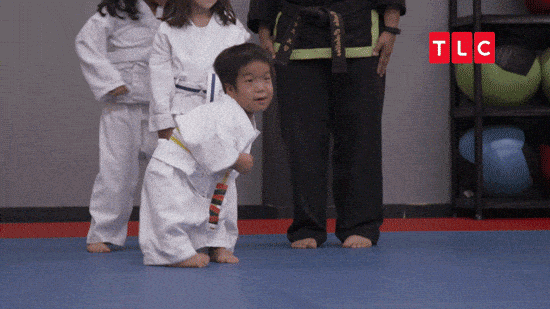
|

|
What is Karate?
An Asian method of blows and kicks. Karate can be with two people playing. When a person defeats another it might win.
Karate is fun and Genesis plays it with Sarah.
Karate - meme gif

Karate - video
Karate - what is it?
What weak kids think they can use to beat others up.
George: Hey you're my bitch now!
Kid: You shouldn't talk to me that way, I take Karate!
George: Oh yeah, well I can still kick your ass!
What does "Karate" mean?
ka·ra·te (kə-rä'tç)
n.
A Japanese art of self-defense (that does not work unless the person you are fighting stands still) in which sharp blows and kicks are administered to pressure-sensitive points on the body of an opponent.
Lady: Oh my somebody just stole my purse!
Bad Guy: Shut the fuck up bitch! You dont got enough money in this purse!
Fat Out Of Shape Karate Guy: I am a black belt in Karate! Stand still so I can hit you and save this woman purse!
Bad Guy: How about I beat you with my boxing skills?
*Bad Guy beats the shit out of Fat Out Of Shape Karate Guy*
Fat Guy: Maybe I should learn a new self-defense, maybe one that works?
Karate - what does it mean?
An amazing tenacious d song.
With Karate I'll kick your ass, from here to Tiannamen square...Oh yeah motherfucker, I'm gonna kick your fucking derrier, yeah. YOU BROKE THE RULES, NOW I'M GONNA PULL OUT YOUR PUBIC HAIR....
Karate - meaning
A Japanese word commonly mispronounced by Americans. See karaoke
Karate is pronounced Kah-Rah-Teh, not Ka-Rat-Ti.
Karate - definition
When you are upset enough with someone to where you want to hurt them, or cause physical harm. Usually an unarmed punch, kick, chop, or variation thereof.
"Dude, say that again and I'll karate you in the face."
Karate - slang
The art of kicking major ass. Karate originated in Okinawa, developed by peasants who were forbidden from carrying bladed weapons, as a method of defense against armored samurai. The classical style is characterized by very hard, short, “square” movements, as opposed to the “circular” movements of traditional Chinese kung fu, or the “long” strikes of Tae Kwon Do. Karate has since moved from Okinawa to Japan, and then on to the Western world after the U.S. occupation following WW2. Since then many “fake” styles have cropped up all over the world, based on traditional karate but lacking the proper techniques to generate power.
A: "fear my 1337 karate skillz!"
B: "Hate to break it to ya, but that ain't karate."
Karate
The Dane Cook of martial arts.
Bob: Watch out, I know karate.
Joe: Douche.
Karate
Something only known by Elvis and the Chinese.
“It's called Karate, man. Only two kinds of people know it, The Chinese and The King. And one of them is me.”
Karate
Karate may be defined as a weaponless means of self defense. It consists of dynamic offensive and defensive techniques using all parts of the body to their maximum advantage. Karate practice is divided into: Kihon (drilling of stances, blocks, punches, strikes and kicks), Kata (pre-arranged forms simulating combat situations), and Kumite (sparring). In each category, the beginner is given instruction at the most basic level until the techniques become spontaneous. As the student progresses technically, he or she progresses physically as well, and advanced practices demand greater stamina. At this stage, the student becomes involved with more intricate and difficult katas and more dynamic forms of kumite. As the student approaches black belt level, technique, stamina, speed, and coordination become natural as a result of strong practice. It is at this stage that the serious student discovers that his or her study of karate has only just begun. The object of true karate practice is the perfection of oneself through the perfection of the art.
Karate is one of the most dynamic of all the martial arts. A trained karateka is able to coordinate mind and body perfectly, thereby allowing the unleashing of tremendous physical power at will. Therefore, it is not the possession of great physical strength that makes a strong karateka; rather it is the ability to coordinate mind and body. Upon developing this ability, even the smallest person finds that he or she has within himself or herself the power to deliver a devastating blow to any would-be attacker. In our everyday lives we often forget the value of exercise to both our physical and mental health. The practice of karate tones the body, develops coordination, quickens reflexes, and builds stamina. Also, the serious practice of karate develops composure, a clearer thought process, deeper insight into one's mental capabilities, and more self-confidence. In this, karate is not an end, but a means to an end. It is an activity in which advancing age is not a hindrance. Rather it encourages proficiency in the keen coordination of mind and body.